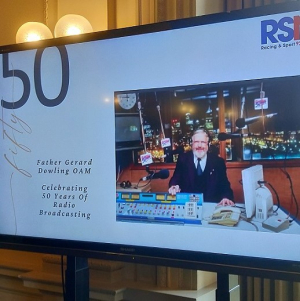Peter MALONE
Sound of Freedom
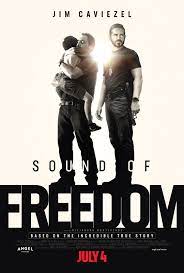
SOUND OF FREEDOM
US, 2023, 130 minutes, Colour.
Jim Caviezel, Bill Camp, Jorge Godino, Jose Zuniga, Eduardo Verastegui, Cristal Rocio Lucas Avila, Yessica Borroto, Gustavo Sanchez Parra, Gary Basaraba.
Directed by Alejandro Monteverde.
An American drama based on child trafficking and the rescue operations by former federal agent, Tim Ballard, which took place in Colombia. In an interview, Ballard indicated that the screenplay dramatised his activities, some touches fictionalised. However, Ballard was able to give testimony to the American authorities and was influential in changing legislation about child trafficking in the US. Which means that this film, with its harrowing moments, is an earnest film about a contemporary evil – with a final comment about the number of men and women in slavery today, so many of them children, a greater number of contemporary slaves than when slavery was legal. Which means that this is an issue that ordinary audiences need to be aware of.
The film opens in Honduras, a little girl at home, beating a drum (and the final sequence of this film will be the little girl once again at home, beating the drum). What seems innocent at first, a young talent scout persuading a father that his little girl should come to an audition, along with her little brother, for some kind of future using her talent. He agrees and delivers them. But, we realise quickly that this is grooming, the children in all kinds of poses, photos taken, provocative, and the woman hurrying the children away so that when the father returns, the location is empty.
The introduction to Tim Ballard follows, a family man with a supportive wife and children, an American agent, posing as a paedophile, undercover to infiltrate the rings. It is alarming to see this kind of work, the infiltration, the pretence, the paedophiles fearful, giving information, arrested. Information leads to rings operating out of Latin America, transporting of children to Tijuana or to Columbia. The drama becomes more personal when a paedophile trafficker is stopped at the US-Mexican border and arrested, the little boy from the initial story found in the vehicle, rescued, telling the story of the disappearance of his sister, Ballard very much moved by the story and wanting to track down the sister.
Tim Ballard allegedly chose Jim Caviezel to portray him in this film. For many audiences, memories of Jim Caviezel in Passion of the Christ and his intense gaze (and executive producer of this film is Mel Gibson). Ballard wants to resume pursuit of the paedophiles but his bosses are reluctant and he resigns. What follows is more undercover work, information from Thailand about paedophiles setting up a hotel and this being the inspiration to set up a fake paedophile hotel in Colombia, inviting participants (including the woman who auditioned the children in Honduras), individuals who would disgust the audience, entrapment, but bringing 50 children to the hotel – then a raid, arrests,. Rescue.
The action does not finish there – it continues with an upcountry journey to the mountains Ballard accompanied by a former criminal who wants now to do good, posing as doctors, travelling to a dangerous village, women and children foot stamping coca leaves for cocaine. As we expect, the little girl is there, another dangerous rescue…
There are two particular aspects to note about the film and its release. In fact, the film was finished in 2018 and, for various business reasons, shelved. It was taken up for distribution by Angel Studios (Angel the name for the many contributors to crowd financing – and a huge list in the final credits). The studios are now working on a number of projects after their release of the Abraham-Isaac story, His Only Son. Production is underway on Cabrini, the story of St Frances Cabrini. Their best known release is the television Gospel series, The Chosen. The other aspect is the extraordinary success at the box office in 2023, second on the list on release, and continuing very successful, over-recouping costs. The film was also taken on by religious groups, buying tickets for audiences. There was also some controversy because of the perspectives of some of the supporting groups, conspiracy theorists, referring to some political attacks focusing on President Trumps campaigns and what might be called crazy allegations.
The film should be seen for its standalone drama and themes.
- The title, indications of freedom from contemporary slavery and trafficking?
- The production company, faith and values based, the film as something of a crusade? Highlighting the reality, the need to combat and confront this kind of trafficking?
- The film based on the character and work of Tim Ballard, as an agent for the government, his experience of child trafficking, his decision to resign, his work in Colombia, tracking down the slaves, freeing them? His return to the US, his testimonies to committees, influencing legislation? Tim Ballard’s choice of Jim Caviezel to play him?
- The opening and closing frames, the little girl beating the drum, her hopes – and the finale, the camera looking through the window and receding as, restored at home, she beats the drums? Honduras?
- The little girl, her little brother, the relationship with their father, the young woman scout, the promises for the audition, the father allowing it, taking the children to the audition and leaving them, the revelation that they were being groomed, the postures, sexual innuendo, the photographs? The woman taking all the children away, the father returning, the location empty?
- The introduction to Tim Ballard, his work, connections? Hunting the paedophiles? The audience seeing the paedophile men, at their computers, the photos? The focus on the one paedophile, the raid, his arrest, the interrogation, Ballard playing good cop, pretending to be paedophile, getting the information, the raid, the arrest? The information about the connection in Mexico, the arrival of the children, transported to the US? The sequence of the border, the driver with the little boy in the back, his lies of explanation? The arrest?
- The little boy, the audience recognising him from the opening, Miguel? Age, loss of time, eight? Apprehensive? Ballard trying to reassure him? Looking after the boy, his growing in confidence, the phone call to his father, the father arriving, the happy reunion? No sign of the daughter? The boy giving Tim the medal of St Timothy?
- The boy, telling the story of his sister and the treatment, the exploitation? Some children taken to Mexico by plane as with Miguel? Others going to Columbia?
- Ballard, the authorities, their being wary, Ballard resigning, going on his own, the connections and information, that the little girl was in Colombia? His decision to go to Colombia? The background of his own family, the support of his wife, his own children? A quest?
- The American authorities, reluctant, but giving him information? The Colombian authorities? Ballard going to Columbia?
- Vampiro, his background, criminal, prison, personality, change of heart, campaigning? His teaming up with Ballard?
- Cartagena, the story from Thailand, the setting up of the paedophile hotel, entrapment? The plan for Colombia, the meetings, discussions, Pablo, the finance, Jorge and the police connections? The building, Ballard and his involvement and enthusiasm, making connections with the paedophile rings, the woman who had groomed the children in Honduras? The plan, for at least 50 children, Ballard and his pretending to be the paedophile, the arrival of two boats of children, the difficulties with the third, the eventual raid, the behaviour of the paedophiles, the boss and the little boy, Ballard taking a stand, everybody arrested, the children rescued?
- The little girl not being amongst those rescued, the story of the cocaine plantations up country, the plan to go, Ballard and Vampiro, pretending to be doctors, with the epidemic, the syringes? The dangers of going beyond the river, going by boat, Jorge, his going back, the two continuing on, the confrontation, men with guns, Ballard going up, meeting the leader, the women and children foot crushing the coca, the leader, the drinking, the singing, the drugs, with the little girl?
- Ballard, meeting the little girl, assuring her, taking her, carrying her, taking the boat, the pursuit, the shootings, meeting up with Vampiro, finally getting her to safety? And the reuniting with her father?
- Ballard, his heroism, with the US government, his success, his foundation, continuing the work?
- The film to be seen by audiences unaware of this kind of traffic, to see the urgency, and the appalling information at the end that there are more in slavery now than when slavery was legal?
Last Voyage of the Demer
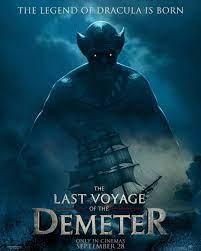
THE LAST VOYAGE OF THE DEMETER
US/UK/Malta/Italy/Germany, 2023, 118 minutes, Colour.
Corey Hawkins, Aisling Franciosi, Liam Cunningham, David Dastmalchian, Chris Walley, Woody Norman, Javier Botet.
Directed by Andre Ovredal.
The voyage is from the Carpathian mountains and a port in Bulgaria through the Aegean Sea and Mediterranean to London. And the cargo includes a huge chest and, inside, Dracula, resting during the day, appearing at night, thirsting for blood. This new Dracula film is based on Bram Stoker’s 1897 novel, specifically the chapter, “The Captains Log”.
Vampires have been in cinema consciousness for just over 100 years, the German Nosferatu in 1922 with its similar story to Dracula. Bela Lugosi was Dracula in the early 1930s and there has been a succession of actors taking on the role, Christopher Lee, and Gary Oldman in Francis Ford Coppola’s classic Bram Stoker’s Dracula. This time Dracula is more of a monster creature, a gargoyle, skeletal, with webbed wings rather than any human appearance. Which means that there is nothing to make Dracula a sympathetic character here. Rather, he is evil, diabolical.
One of the great advantages of this story is the reconstruction of the sailing ship, the Demeter, the vast hold storing the cargo, the high masts and sails, the slippery deck and steering wheel. The audience can vividly relive the experience of the hardships and dangers of 19th century sailing, the winds and storms, the perils of the sea.
The central character here is Dr Clemens, played by American actor Corey Hawkins. He is a medical graduate of Cambridge, unable to find a position in England, at a port trying to become a ship’s doctor. The reason for the prejudice. He is black. He is well spoken, skilled, something of a philosopher-scientist puzzling about the meaning of life, puzzling about the presence of evil, his scientific background questioning the possibility of Dracula’s horror with its supernatural overtones. The crew is small, led by the sympathetic Captain Eliott, Liam Cunningham. Soon into the voyage, they discover the young woman, Aisling Franciosi (so strong in the Australian film, The Nightingale), drained of blood, needing continual transfusions, ultimately revealing that she comes from Dracula’s village and tells his story of power for centuries.
This is a film of atmosphere, drawing us in with its drama, increasing foreboding, atmosphere of fear, then the grim revelations, crew disappearing, members of the crew mutilated, all the livestock drained of blood… The captain’s grandson, Toby, Dr Clemens had saved when the Dracula chest was about to fall on him, blames himself for the death of the livestock that he cared for, becomes the target of Dracula’s thirst for blood. No sentimentality about children in this story.
The film draws on traditional aspects of vampires, sleeping during the day, roaming and terrorising for blood each night, merciless. There are religious emblems, but no stake through the heart. And there are some terrifying moments as Dracula’s victims are exposed to sunlight and become ablaze.
This is a very serious Dracula story, an appeal to audiences response to the drama rather than just simply your average horror story.
- The significance of Bram Stoker’s Dracula, at the end of the 19th century, the tradition of film versions, from Bela Lugosi, to the Hammer Studios, television versions, Francis Ford Coppola? This film in the tradition?
- The screenplay based on the chapter of Bram Stoker’s novel, The Captains Log?
- The ship, the wreck, empty, the log?
- The opening, the port, the ships, the framework for the story? Cargo, crews, ordinary busy work, the mysterious chest, the suspicious characters? The emblem on the chest? Sinister?
- Introduction to Clemens, at the port, a qualified doctor, race issues, the reactions of the men, the crew, his saving the Captain’s grandson, welcome to board? The focus of the drama on him, his personality, education, calm, skills?
- The crew, different nationalities, the leadership of Captain Eliott, Irish background, with Toby, Toby and his role on the ship, caring for the animals? Woychyk, second-in-command, having the confidence of the captain? The other members of the crew and their interactions, the cook and his demands, religious perspective? The cargo?
- The reconstruction of the ship, vast, the depth of the hold, the cabins, the masts and sails, the deck?
- Audience knowledge of the Dracula story, expectations, the falling of the chest almost killing Toby? Clemens and the rescue? The soil coming out of the chest?
- The young woman, considered a stowaway, wanting to throw her overboard, Clemens and his care, needing blood, the transfusions? Her gradual improvement? Her story, the village, Dracula, in control of the village and its inhabitants for centuries? Taking their blood?
- The gradual revelation of Dracula, the Nosferatu appearance, gargoyle, skeletal, with wings? The attack on the member of the crew, blood, mutilation, the body overboard?
- The atmosphere of fear, the different perspectives, the cook and his themes of religion, the devil? His ultimately leaving the ship, the boat, Dracula’s attack, his death?
- The Captain, decisions, watch? The wheel, fixing the wheel? The crew member at the wheel, sympathetic character, the attack, his bleeding, tied to the mast? His comments, hearing everything, interior feelings, the sun coming up, death in the blaze?
- Clemens, the meal table, wanting the meaning of life, his scientific background, philosophy, sceptical about religion? His bonding with the stowaway? Her explanations?
- Toby, the death of all the animals, their being drained of blood, his feeling the responsibility? His sensing the presence of Dracula? Hiding, the back attack and banging on the door, ultimately, his death? Audience sentiment at the death of a boy? The captain’s response, the funeral, saying that he was alive, to be thrown overboard, opening the cloth, the body ablaze?
- Clements and the stowaway, examining the cargo chests, the discovery of Dracula’s chest?
- The final disappearance, the captain and his loss of hope, but he saying that he was faithful to his task on the sea?
- The weather, the storms, the attack on Clemens, Dracula becoming more powerful?
- The trap for him, the wheel, the fire, the shooting? The stowaway setting herself up, firing the rifle?
- The two adrift, the ship near the English coast, the stowaway, her loss of blood, her farewell to Clemens? Her drowning?
- Clemens, his explanation of his studies, Cambridge, rejected, travelling, on the ship? The information about Carfax Abbey, his enquiries? But the confrontation with the elegantly dressed Dracula in the street?
- And the audience knowing what was to follow?
Fr Gerard Dowling, 50 years on radio, Family Counsellor - Congratulations
Fr Gerard Dowling, 50 years on radio, Family Counsellor - Congratulations

We offer our congratulations to Gerard Dowling. On September 2nd he will have been on radio 3UZ (with its various names, now RSN) for 50 years, a record for any broadcaster.

View from the window of the Federation Room, St Patrick's Cathedral. It was said that because Bourke St had such a fine view of the Cathedral, Parliament House was built to block it. But it can be views from the back windows!
Gerard, ordained in 1958, a priest of the archdiocese of Melbourne, for many years Dean of the Cathedral, has offered a sympathetic and wise ear to a range of people on Sunday evenings, who wanted to be heard, express their problems.

Wecomed by the Minister
A Golden Jubilee celebration was held at Parliament House, Melbourne, on August 17th, 75 guests, family, co-workers, friends – welcomed by Anthony Carbines, current Minister for Police, Crime Prevention and Minister for Racing, Gerard a friend of the family. Speeches by managers and comperes of RSN, and Phil Touzel, Gerard’s long time producer. And by Denis Pagan, player and coach of North Melbourne – Gerard wrote the history of the club.

Phil Touzel speaking
MSC Connections. Gerard lived in the cottage at the Family Care Sisters, Canterbury, while the main house was the Heart of Life Centre in the 1980s and 1990s. Peter Malone has been a regular contributor, especially for reviewing the year’s films for the Christmas night broadcast. Paul Castley is confessor at Justin Villa, Balwyn, for retired priests, where Gerard has lived in recent years.

An anniversary for our Province Website
An anniversary for our Province Website
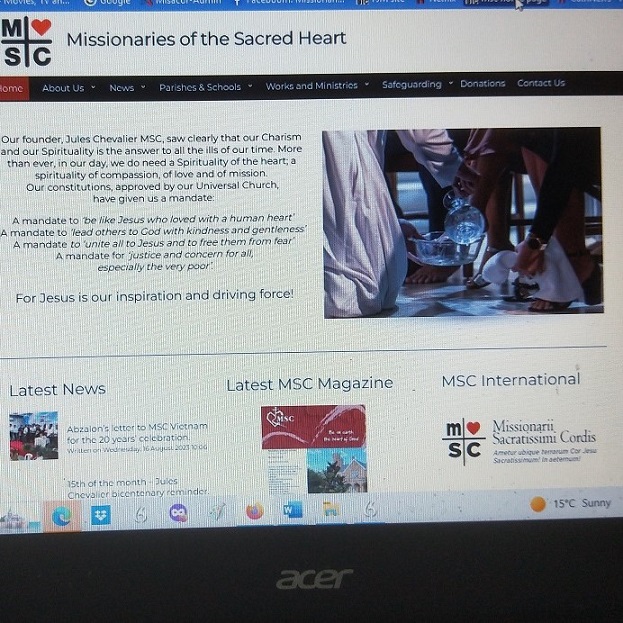
(Pictures from the computer screen that has posted for the last six years)
Today it is 13 years since this present phase of our site began. There had previously been entries between 2006-2009 (all available through the Search engine). There was updating in design and access in 2013 and again in 2018. At present, there is preparation for more updating.
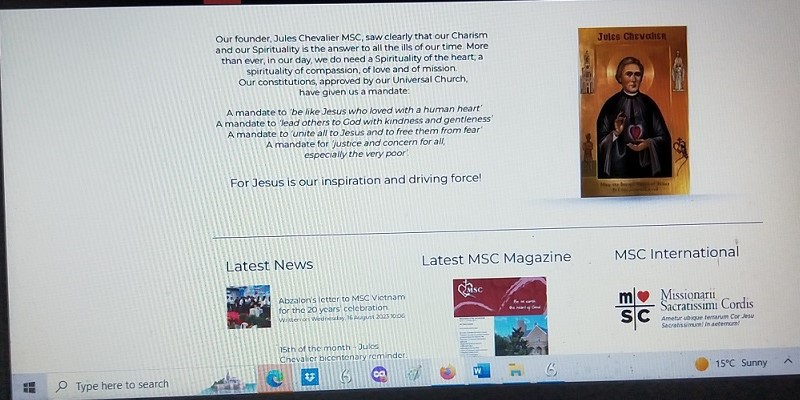
We have six items posted each week (resting on Sunday!) and a short Christmas-New Year break.
All posts are immediately available on the Province Facebook page.
An encouragement to use the Search Engine: go to the top bar and click Current Newes, insert names and issues you would like to find on the line which says Type here to search and press Enter (seen near the top of the photo below)
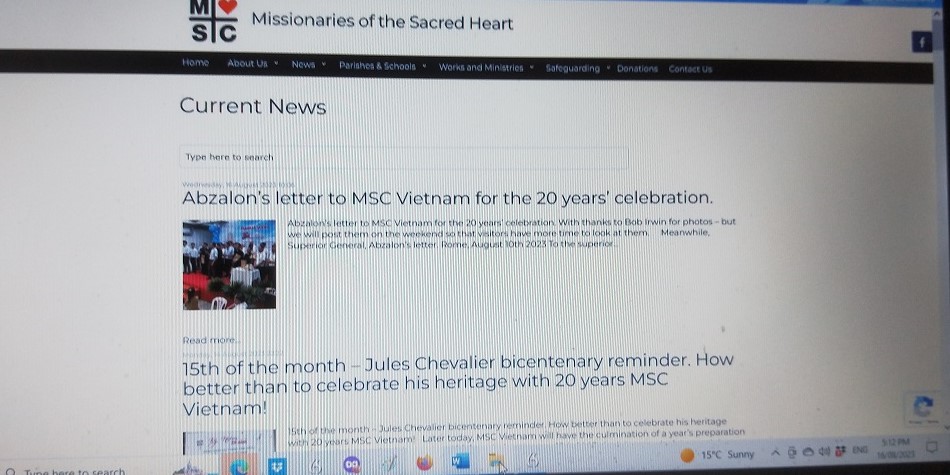
A future development is in the posting of e-books, the picture showing two that are available. Click the cover of the photo and the book immediately downloads. (Bishop Gsell’s The Bishop with 150 Wives is there.) Future e-books include The Australian Province History of Communication and Media, a history of recent years in MSC ministry in Adelaide by Paul Cashen, and An Annotated Bibliography of the Province and about the Province.
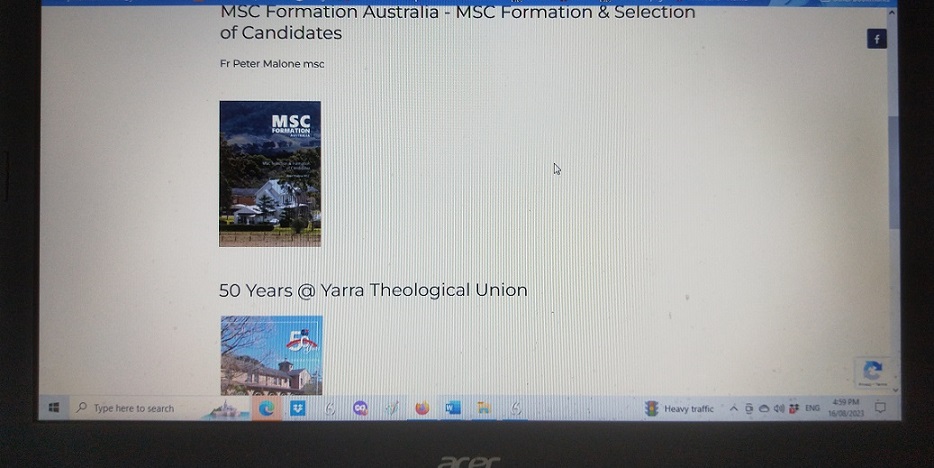
Michael Fallon’s site, John Rate’s Scripture videos and Peter Malone’s site can also be found on the site.
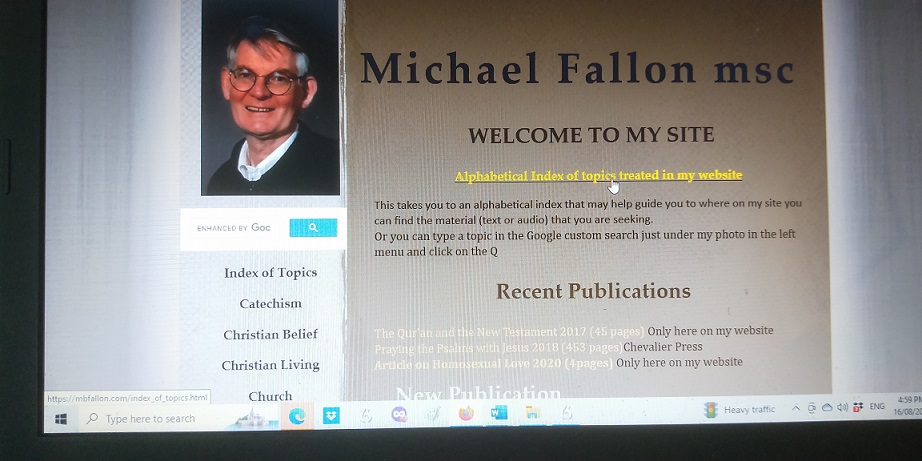
The invitation is to explore and see what is available, information on the Chevalier Family, the Laity of the Chevalier Family, Ministry information, a Safeguarding section.
And for further news and Vocations Promotion, go to the Australian MSC Vocations Facebook page which is managed by Trieu and Hoa our students at Cuskelly House, Blackburn.
Abzalon’s letter to MSC Vietnam for the 20 years’ celebration.
Abzalon’s letter to MSC Vietnam for the 20 years’ celebration.

With thanks to Bob Irwin for photos – but we will post them on the weekend so that visitors have more time to look at them.
Meanwhile, Superior General, Abzalon’s letter.
Rome, August 10th 2023
To the superior MSC in Vietnam.
To the provincial superior MSC in Australia.

This Jubilee celebration is also a moment to stop, take stock, and start once again to live the present moment, open to the emerging future of the Congregation in Vietnam.
Obtaining official recognition of our MSC Society in Ho Chi Minh (Saigon) City is an important sign of God’s blessing on our presence in Vietnam. We are aware of the enormous efforts and patience that have been needed by you in striving for this goal.
Thank you, confreres, for your living witness of perseverance and resilience in the processes you have gone through so far. During these 20 years, you have shown to the whole MSC Society what our Founder said:
The undertaking may appear foolhardy, but we have signs of God’s blessing. In so far as the arm of God remains with us, confidence is a duty. Our prayer is that the divine Heart of Jesus may guard and protect the Society always. May he give us, as one of his favours, a great fidelity in seeking only what brings him glory. (Jules Chevalier, 1866)
May Our Lady of the Sacred Heart continued to intercede for our mission in Vietnam so that the ministries you carry out may show that “we know and believe the love God has for us”. (1 John 4:16)
Please extend our congratulations to the Laity of the Chevalier Family, benefactors, and members of your families. Once again thank you and may God continue to bless you.
In Corde Jesu,
Mario Abzalon Alvarado Tovar
Andre Claessens, MSC
Paulus Pitoy, MSC
Chris Chaplin, MSC
Humberto Henriquez, MSC
MSC General Leadership Team
15th of the month – Jules Chevalier bicentenary reminder. How better than to celebrate his heritage with 20 years MSC Vietnam!
15th of the month – Jules Chevalier bicentenary reminder. How better than to celebrate his heritage with 20 years MSC Vietnam!
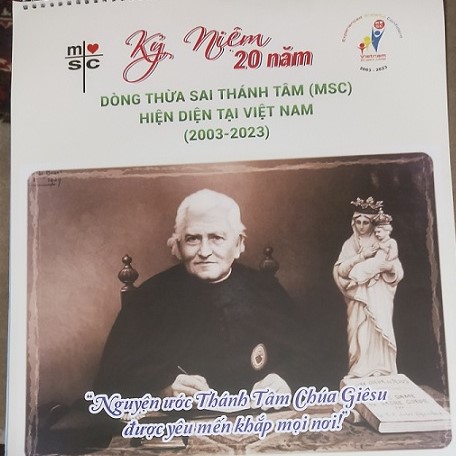
Later today, MSC Vietnam will have the culmination of a year’s preparation to acknowledge and celebrate the MSC foundation, August 15th 2003. And the wonderful growth in these 20 years, our many confreres.
We post ahead of Vietnam time, so more on this site tomorrow…
Matchmaker, The/ Saudi Arabia

THE MATCHMAKER
Saudi Arabia, 2023, 81 minutes, Colour.
Husam AlHarthi, Reem AlHabib, Nour Alkhadra.
Directed by Abdulmohsen Aldhabaan.
The Matchmaker offers an opportunity for reflection on the status of women, the dominance of men, in Saudi Arabian society – memories of women being forbidden to drive, have business opportunities…
However, this film may be quite surprising to some audiences – perhaps for Saudi Arabian men.
It is brief, but rather unhurried in its treatment of its theme, a number of audiences finding it boring. However, the theme is important, relationships between men and women, assumptions of male superiority, the response and revenge of women. It is something of a moral fable for our times.
The film opens with a narrative about a woman, oppressed, going into the desert, a voice hearing her, her husband coming, finding a ring, it setting him on fire, his returning as his wife’s servant, at beck and call. Then there is a transition to the contemporary city, an IT worker coming home, his wife and daughter, their enjoying each other’s company, the husband always late, having his meal, sleepless during the night, spying on his neighbours, going to work, the attraction towards Salma, secretary, warning her about harassment, yet his obsession with her. She resigns from the company and goes to a distant resort, he goes on a flight following her.
The dry mountainous rocky scenery of the resort is fascinating.
The resort is comfortable, men in uniforms functioning, an audience with the Matchmaker, promises of further weddings… However, gradually the man becomes alert, feeling he is in prison, unable to move freely, escaping and meeting the father of Salma who wants his daughter back again, observing the ceremonies of marriage, the husband leading the bride in wedding dress on a camel, a scarf-masked red uniform band playing. Ultimately, he tries to escape, is trapped. And, throughout the experience of the resort he has some strange dreams, imagining himself at home, playing the game with his wife and daughter.
There is a complication at the end, somewhat difficult to follow, Salma confronting the man, removing the gift of the ring which he has not been able to remove, seemingly freeing him – but, ultimately, like the Matchmaker, she sits and observes a slow motion troupe of red garbed men, servant/slaves, trekking through the desert.
Paradise War: The Story of Bruno Manser
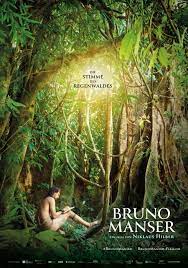
PARADISE WAR: THE STORY OF BRUNO MANSER/ DIE STIMME DES REGENWALDES.
Sweden, 2019, 122 minutes, Colour.
Sven Schelker, Nick Keleslau, Elizabeth Ballang, Mullane, Matthew Crowley, David K.S. Tse, Benjamin Mathis.
Directed by Nicklaus Hilber.
A film to be recommended, a film about environmental issues on a local scale, on a world scale. It is the story of Bruno Manser, a Swiss activist, rebellious in his young days, in prison at 19, following Gandhi’s nonviolence principles, studious, visiting Malaysia and Indonesia, deciding to try to find the nomadic tribes, the Penan, in the jungles of Sarawak, finding them, accepted by them (a scene reminiscent of Jeremy Irons in The Mission, playing a recorder/flute), joining them completely in their hunting (some humour at his learning), dress, moving around, details of their way of life, and the attraction of the young girl, Ubung. But he also wears his glasses and spends a great deal of his time writing in his notebooks (well illustrated and later published).
The opening of the posting in Wikipedia about him as helpful as background:
Bruno Manser (25 August 1954 – presumed dead 10 March 2005) was a Swiss environmentalist and human rights activist. From 1984 to 1990, he stayed with the Penan tribe in Sarawak, Malaysia, organising several blockades against timber companies. After he emerged from the forests in 1990, he engaged in public activism for rainforest preservation and the human rights of indigenous peoples, especially the Penan, which brought him into conflict with the Malaysian government. He also founded the Swiss non-governmental organization (NGO) Bruno Manser Fonds in 1991. Manser disappeared during his last journey to Sarawak in May 2000 and is presumed dead.
He finds the Penan in 1984 and experiences the inroads of logging industries, the incursions into the jungle, the demolition of the trees, the wasted open spaces. Working with the various nomad tribes who are being driven back into the forest, losing the animals for food, he organises protests, non-violent, barriers on the road, confrontations with the drivers, with the bosses, with the police, condemned by the local governments and authorities in Malaysia (denounced and ridiculed by Prime Minister Mahathir Mohamad). This goes on for a long while, assisted by the media who publicise his story – but the criticism of a middle-class white man coming in as a saviour for local tribes.
The government supported the logging, and also of incorporating the nomads into settlements, including the young woman, Ubung. Ultimately, Manser returns to Europe, spends many years organising protests against logging, demonstrating, hanging huge posters from buildings, interviews with officials of trade, a meeting with UN Secretary General, Boutros Boutros-Ghali, achieving some aims, but not preventing the settlements and the modernising of the nomads.
Eventually, Manser returns to Malaysia, meets the older Along Sega, who had accepted him and had become a father figure. He also encounters Ubung, now married with a child, adapted to the settlement. He is still pursued – escaping from the authorities, but lost in the jungle, never found.
Manser made a documentary, SAGO, 1997 and several documentaries also made about him.
- Audience knowledge of Bruno Manser? This film providing his life story, his work, his character, his ambitions, his campaigns?
- The narrative filling in his background, Switzerland, his parents, their criticisms of him, the later scenes of his parents when he returned to Switzerland, his devoted mother, his critical father? His coming to Sarawak, searching for the Penan, the trek through the mountains, writing in his notebooks, always wearing his glasses, finding the tribe, watching them hunt, the lifestyle, family, on the move, his playing the flute, the music, his being accepted, joining them, dressed like them, the scenes of learning to hunt, the boar, this celebrating his success, Along Sega as his father figure and friend?
- 1984, logging, in the jungles, the felling of the trees, the processes for logging, the companies, the workers, the drivers? The encroachment on the nomads hunting lands? Business, government, police?
- Bruno, the plan of protest, non-violent, the barriers on the roads, the confrontation with the drivers, the threats, government officials, the police? Over a long period?
- The journalist, supporting Bruno, the media arriving, the interviews, television coverage? Praise? Criticism of him as a middle-class white man? The journalist ultimately selling out, the government of the companies and their payments?
- Bruno as part of the nomad tribes, the sequence of the snake biting him and his cutting his wound, healing?
- The buildup to the confrontations, the offers of money, his refusal, the confrontations, the police, withdrawing, returning, the potential for violence?
- Bruno, the authorities, his being expelled? Returning to Switzerland?
- The 1990s, his return, with his family, with those in the office, the protests, the foundation, the hard work, appeals, protests and the hanging of the banner, the interview with the trade chief, going to New York, the UN, Boutros Boutros-Ghali and the support?
- Gradual progress against logging? But the disappointment about the settlement of the nomads, the arguments that nomad tribes should be modernised, “civilised”?
- His return to Sarawak, the reunion with Along Sega, Bruno’s disappearance, never found?
- An interesting film, a reminder of the campaigns from the 1980s and environmental awareness, anti-logging…?
Fear of 13, The
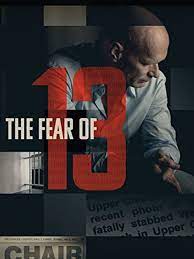
THE FEAR OF 13
UK, 2015, 96 minutes, Colour.
Nick Yarris.
Directed by David Sington.
For most audiences, this is a compelling documentary. However, audiences who have come across it and prefer fast action films, have found it very boring. But, boring it is not.
We are informed at the beginning that this is a film about a one time young petty criminal, who was charged with rape and murder, his previous prison sentences added to, finally finishing on death row. After 20 years on death row, we are informed that he made a petition that he should be executed. However, he was not executed – and, his plea of innocence was vindicated with the introduction of DNA samples, checking, detection, finding the true of offenders. But, even this took a long time in the latter part of the 20 years of the 20.
This 96 minute film is mainly close-ups of the subject, Nick Yarris, speaking to camera. He is in his 40s, somewhat gaunt, bald, very direct to camera. In fact, his narrating of his story is so articulate and persuasive it seemed necessary to do some checking, surely this expert telling of a life was a script and spoken by a professional actor. But, no, this is the actual Nick Yarris.
His story is compelling as is his manner of telling the story, pacing, earnestness, some self-condemnation, admitting his petty criminal history from the age of 15, stealing and selling cars to a dealer to disguise and re-sell them, the introduction to drugs, being ousted from home, on the streets, arrest and prison. There is also the vivid story of his being transferred, going to the restroom at a service station, a kind of comedy of sequences and events which led to his escape, stealing a car, going to Florida, hiding… But, he is discovered sleeping in his car, arresting policeman seeing his gun protruding from a cover, conflict, his outwitting them, his getting his father to phone the FBI, his arrest and subsequent trial, the police changing their story. He has some relish in recounting the trial and the jury seeing through the full stories by the police.
However, far more serious was the accusation that he had raped and stabbed to death a young mother. The jury took very dim views of this and he was sentenced to prison, to life, to death row.
A great deal of his narrative concerns what it was like to be sentenced to prison, the violence of some of the wardens, solitary, meals and disputes, everyone punished because of the action of one prisoner, and eventual attack and rape. But, there is the other side of his time, beginning to learn, the use of words, studying, reading, becoming quite an accomplished wordsmith. And, as with so many stories, there is a woman who takes an interest in the prisoner, meets him, helps him with his pleas, romance and marriage but, after so many years of trying to help, her not being able to cope.
And, all the while, as he tells his narrative, spins his story, we are wondering where it will lead to – eventually to discoveries with DNA samples, the long time that it took (unconscionable when you think back on it) to do the investigations and to get the results, and, at the end, the prison wardens unhappy with his release.
One of the reasons that this is a British documentary is that after his release he moved to England, married, has a daughter, tells his story. And the director, David Sington, is also British with many nominations and awards for his documentaries.
Coming Through the Rye
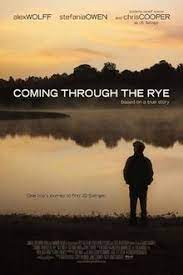
COMING THROUGH THE RYE
US, 2015, 97 minutes, Colour.
Alex Wolff, Stefania Owen, Chris Cooper, Jacob Leinbach, Eric Nelsen, Jacob Rhodes, Adrian Pasdar.
Directed by James Stephen Sadwith.
While Coming Through the Rye has been long a popular song, the word Rye has now been long associated with J.D.Salinger and his classic novel, The Catcher in the Rye, with his teenage central character, Holden Caulfield. This is a film about a young student who resonates with the book, with the character, with his issues, feeling that Salinger in this book truly understand him. He writes a dramatic treatment of the novel, using mostly Salinger’s own words. Then he goes on a quest to find Salinger.
Audiences might like to check on the Wikipedia entry for Salinger to find out details of his more active life, relationships, military service before writing his novels and short stories and his later desire for seclusion. In fact, his being a recluse and antagonistic towards the media (voiced in some of the dialogue in this film) is very well known. After his death in 2010, there was a fine documentary, Salinger, with interviews from a wide range of people. And, he has been portrayed in some films, especially by Nicholas Hoult in Rebel in the Rye, by Tim Post in My Salinger Year, and by Oscar-winner, Chris Cooper, in this film. Salinger is isolated, plagued by people coming to find him, antagonistic towards the media, disliking theatre and cinema and any attempt to transform his work into film or play. He has a gruff manner, especially towards the young man who seeks him out, but shows a more humane and encouraging support of him later in the film.
The young student, Jamie Schwartz, played by Alex Wolff, bonded very much with his brother who went to Vietnam and has been killed, Jamie not being able to accept it. He is transferred to a wealthy school, taunted as being Jewish, ridiculed because of his manner, knowledge, bullied, an attack on his room and possessions. And, with his play and wanting to put it on, and it serving as a graduation assignment, the boys getting a copy of it and reading it mockingly.
Jamie also acts and is seen as Mercutio in a version of Romeo and Juliet. And he is attracted to one of the girls in the play. However, he makes friends with Deedee (Stefania Owen) and persuade her to drive him in his pursuit of Salinger, supporting him, after letters to Salinger and other authorities are not answered, advised by Salinger connections that it is useless to pursue him. However, they drive, are some questions, get some answers and find Salinger. They also stay at hotel, posing as husband and wife, and a scene then of cautious sexual awakening. After the rejection by Salinger, Deedee talks to Jamie’s mother and learns about the death of his brother, and determines to take him back to the school – and, leave him at the gate with “abandon hope all ye who enter here”.
However, he makes an impression on the authorities, urge to speak to the assembled students to explain his story about finding Salinger. The play is performed with one of his antagonists in the central role, the audience applauding, and Jamie deciding to return to Salinger to give him a copy of the play – which Salinger rejects.
A variation on a coming-of-age story, and of interest to fans of Salinger.
- The title? The Rye? Catcher in the Rye? Holden Caulfield? Salinger, the status of his novel, reputation? The reputation of Salinger and his seclusion?
- 1969, atmosphere of the Vietnam war, student protests, the reputation of Salinger’s novel, student identification with Holden Caulfield?
- The US in 1969, homes, schools, students, upmarket college, bullying and prejudice students, the staff, encouragement of students? Theatre performance? Audiences? The travels to find Salinger, the American countryside, the characters in the town and the range, not knowing Salinger, the children and their mother informing Jamie?
- Jamie Schwartz’s story, at home, his mother, bonding with his brother, to Vietnam, his death, Jamie unable to admit his brother’s death? Going to the college, wary, the reception, some friendly, some hostile, anti-Semitic tones? His studies, boys mocking him, the bullying, the disrupting of his room, stealing his letter to Salinger, the edited sequences of different boys reading the letter, their ridicule?
- Jamie and his obsession with Catcher in the Rye, identifying with Holden Caulfield, feeling that he was truly understood? Adapting the novel into a play, keeping Salinger’s words? The discussion with the teachers, his play as a project, that it should be performed?
- Jamie, awkward, age, friendly with the girl in the play? The meeting with a Deedee? Bonding with her? His decision to find Salinger, writing the letters, everything being returned? Deciding to travel, with Deedee, despite her parents? The countryside, the town, the range of people questioned, their not knowing Salinger, or not saying? Three little children, the revelation of his location, the mother? Directions?
- Finding Salinger, audience anticipating his character, gruff, unwelcoming, talking with Jamie, forbidding the play being performed, his antagonism towards theatre and cinema, towards reviewers?
- Jamie and Deedee, the night at the hotel, posing as husband and wife, the intimacy, sexual awareness, Jamie and his reserve? Deedee and her limited experience? His going for the walk, the consequences?
- The return, Deedee ringing Jamie’s mother, the truth about his brother, persuading him to go back to the school? At the gate, abandoning hope…?
- The Chapel, the teachers, the boys, the reading, the teacher summoning him, his being asked to tell his story in the Chapel, the flashbacks prompting him? The performance of the play despite Salinger, the boy in the central role – and an apology and reconciliation, success, applause, success for his graduation?
- The decision to go to Salinger, Deedee and her driving, taking his name off the play, offering it to Salinger, Salinger inviting him in, the serious talk, encouraging him?
- Jamie, his future, abandoning the play?
